How Postman became India's biggest SaaS startup
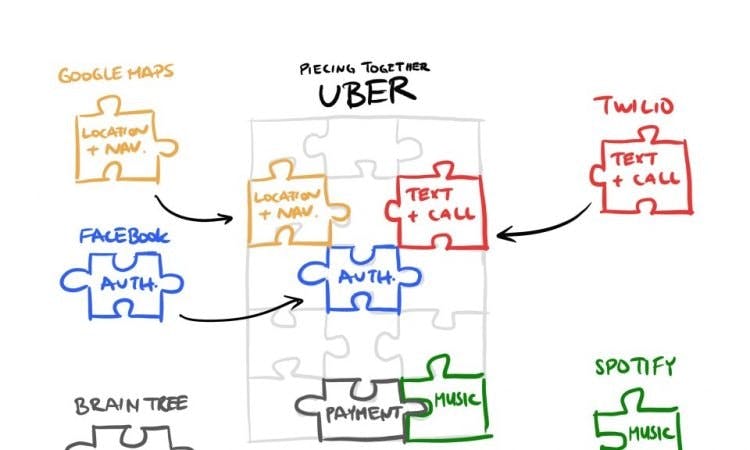
Postman solved a very important problem for the API economy: building and managing APIs.
How did Postman become India's biggest SaaS startup? Simple.
A technology called API was taking off before their eyes and they realized that APIs would be a huge market in the future, so they bet their whole company on APIs. And then, they executed brilliantly to become the No.1 API platform.
That's it. Article over😂.
<a few moments later>
Now let's look at these points in detail.
About APIs
Since I'll use the term "API" many times in this article, I'll explain its meaning to you first:
If you search "API" on Google, you'll get this:
"API is the acronym for Application Programming Interface, which is a software intermediary that allows two applications to talk to each other."
😴😴
Time for a simple explanation. Look at this picture – it is Spotify's login screen.
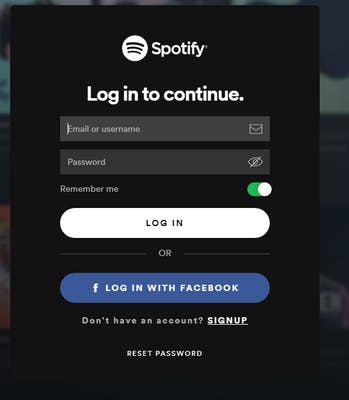
Do you see the "login with Facebook" button? Behind that button is an API - the Facebook API. When you click that button, the Facebook API connects your Facebook account with Spotify, so that Spotify can get your name, email, and image from your Facebook account.
So an API connects 2 applications and allows them to exchange data. To put it even more simply: 2 applications talk to each other using an API.
There are 3 types of APIs: internal, public, and vendor. Companies use APIs to simplify stuff inside the company. Such APIs are called internal APIs.
Do you remember all those Chrome extensions and Telegram bots for booking vaccine slots on Cowin? They were built using Cowin's API. That's a public API. Anyone can use Razorpay's API to start accepting payments online from customers. This is an example of vendor APIs.
Internal and public APIs are used to access some complex piece of code simply. But vendor APIs let you access the entire company through the API. For example, the entire company at Razorpay is making the Razorpay API. So when you access their API, you are in fact accessing the entire company through the vendor API.
The third type of APIs, vendor APIs, are the center of the API economy.
Postman's crazy bet on APIs:
At the beginning of the article, I told you that Postman saw APIs were taking off and decided to bet the entire company on APIs.
But did you stop to think: why APIs?
After all, APIs are just used to connect 2 applications. What did Postman see in APIs?
They bet the whole company on the API economy. Was the API economy really going to become that big? Or was it just a crazy gamble by Postman?
To answer these questions, let's take a deep dive into the API economy.
The modern API revolution was started by Jeff Bezos in 2002 when he issued special instructions to all engineers inside Amazon. These instructions are famously called "The API Mandate." He used the API mandate to turbocharge Amazon's growth. But another Jeff inside Amazon (there are a lot of Jeff's at Amazon; this Jeff was a product manager at Amazon) realized the power of APIs and left Amazon to start his own "API company." Today, his "API company" is a $65 billion API giant called Twilio.
And of course, the biggest API company, Stripe, was started by 2 brothers from Ireland. They started with a simple API for accepting online payments and today, Stripe is a $95 billion fintech giant.
Today, the API revolution started by Bezos in 2002 has turned into a huge API economy. But I still haven't told you exactly why is the API economy so powerful. To explain that, I’ll you a story. It’s not fiction, it’s a real story.
The year is 2009. Travis and Garrett are frustrated when they can’t find a cab. So they built an app to solve their problem. We know this app as Uber.
Building the app for Uber was hard. Drivers needed maps for reaching the destination. Uber needed to call and text customers. Uber needed to add a payment service inside the app so that customers could pay online.
Here, Uber had choices:
The idiotic choice: Uber could solve all these problems by itself. But maps and payments and call/text are very difficult problems. It would have taken millions of dollars and hundreds of years just to launch the app!
The smart choice: Leave these problems to the experts and focus on the main problem.
Thankfully, Uber chose the second option.
Uber realized that their main problem was to build a cab service. Payments and calls/text and maps were secondary problems. These secondary problems would only distract from the main problem. So they used APIs to solve their secondary problems:
Google had already solved the maps problem — they had spent a lot of time and money to make Google Maps. So why should Uber waste time doing the same and build a 3rd class Google Maps? Uber used Google Maps API to connect Uber's app to Google Maps.
Twilio had already solved the call/text problem: They had spent a lot of time and money to deal with telecom companies and build a simple call/text solution. So why should Uber waste time doing the same and build a 3rd class Twilio? Uber used Twilio API to connect Uber's app to Twilio.
Braintree had already solved the payments problem: They had spent a lot of time and money to get permission from banks and regulators and build a simple payment method. So why should Uber waste time doing the same and build a 3rd class Braintree? Uber used Braintree API to connect Uber's app to Braintree.
Uber solved all its secondary problems without wasting time on them. And Uber got the best maps and best call/text solution. That's the power of using APIs.
Not just Uber, but lots of startups/companies that use APIs for their secondary problems get cheap (just a few dollars per month) and best-in-class solutions (for example, Stripe has the best payment API, yet they improve the API 16 times in a day!) to those problems.
This makes APIs very special. And this explains why Postman bet their entire company on APIs.
The companies making APIs (API companies) have a huge market in front of them. Plus, they have a strong moat to defend against competitors.
1. Massive Markets. API companies each provide a small slice of the things every business needs to do. Almost every company needs to collect money, remain secure, and communicate with customers.
2. Moats. They’re in a position in which companies can’t just rip them out (imagine not accepting payments for even a day!) and where it’s probably not worth the resources or defocusing to build a different solution in-house.
API companies are constantly improving their product, and even small improvements add up to give big returns. They get access to a lot of data, so they can improve their product even further.
India also has a booming API economy
"Investors have begun to realise the role APIs can play in businesses and the need for developers to get access to proper tools to develop and manage these APIs. In addition to Postman, they have been making bolder bets in the API ecosystem in 2020. For instance, Chennai-headquartered Yap raised Rs 10 crore in angel funding early this year from top investors including Amrish Rau, former CEO of PayU India, and Kunal Shah, founder of Cred. In another example, RapidAPI recently raised another $25 million from existing investors, including Microsoft."
This is why API companies have such a bright future! And this, my friends, is what makes the API economy so powerful.
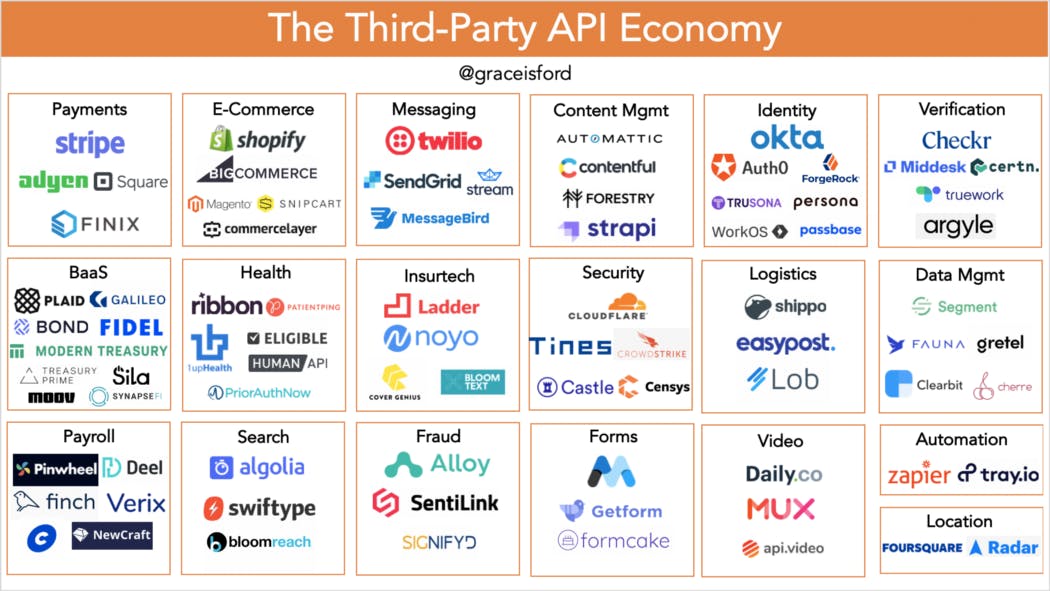
Credits: https://gisford.medium.com/the-third-party-api-economy-891b2a774fa5
Postman's execution:
Now you understand that Postman's crazy bet wasn't s crazy after all. APIs are an important part of the software industry, and the API economy will keep growing in the future.
But I still haven't told you where Postman fits in the API economy.
Let's start with what Postman does.

Credits: Postman website
Developers and companies make APIs: public, private, or vendor API. These APIs need to be built, tested, documented, maintained, etc. This is what Postman does – it helps companies to maintain, build, document, and test their APIs.
In the last section, I showed you that the API economy is huge, and Postman is directly serving the API economy. So it was expected that Postman would have lots of customers, but I was surprised to see their customer base - 17 million developers and 5 lakh companies!
The figure of 17 million developers is shocking because there are ~27 million developers in the world. This means 63% of total developers use Postman!! Amazing, isn't it?
Their customer base of companies is equally impressive: Microsoft, Salesforce, Twitter, Slack, Zoho, Intel, Shopify, Box, Goibiobo, Intuit, Imgur, and Cisco.
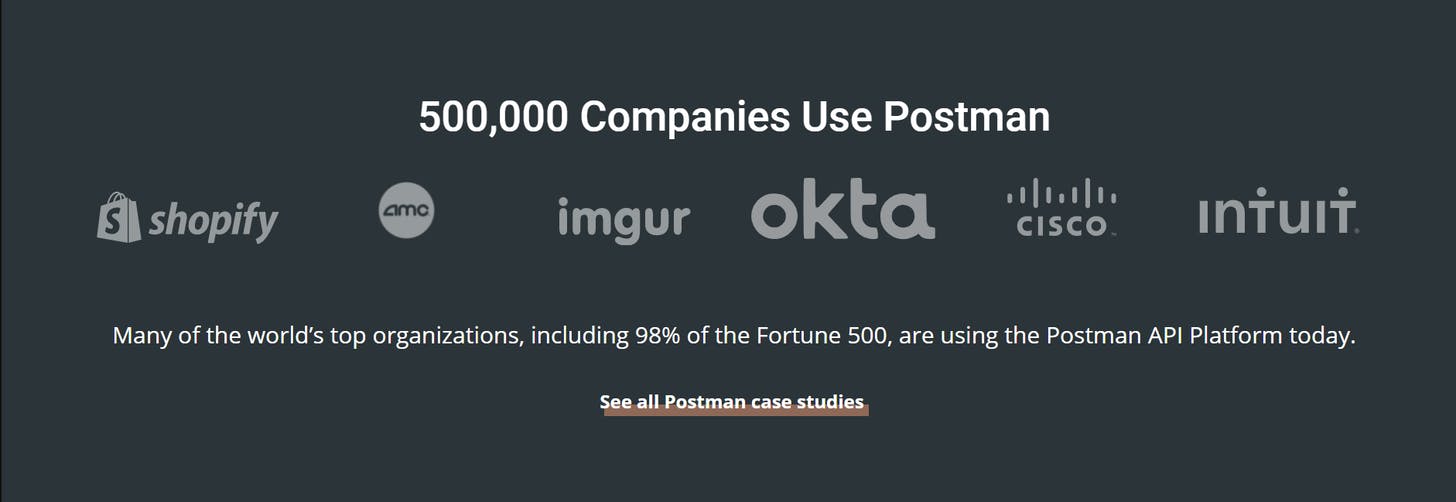
Credits: Postman website
Right now, Postman's idea seems obvious. Of course, the API economy was going to be huge and of course, APIs needed to be maintained.
But back in 2012, this idea wasn't obvious at all. Abhinav Asthana and Ankit Sobti (Postman's cofounders) were interning at Yahoo. While working on APIs, they faced some problems:
"It was also painful for the development team to test and debug APIs. Whenever an API was updated, we’d have to start all over again."
Then they faced the same problems again when they working on Abhinav's first startup TeliportMe: there were no tools for API management. Abhinav searched for the solution to his problem, but couldn't find it anywhere.
So he created the solution himself.
"That’s when I had an idea to write an early version of Postman as a basic HTTP client for Chrome. It solved my own problem, and then some of my co-workers wanted to use it too."
Since this was a product for developers, Abhinav launched it a place where developers would surely notice it: Stack Overflow. Someone was asking for help with APIs, and Abhinav replied with the link to Postman. Abhinav's comment went viral.
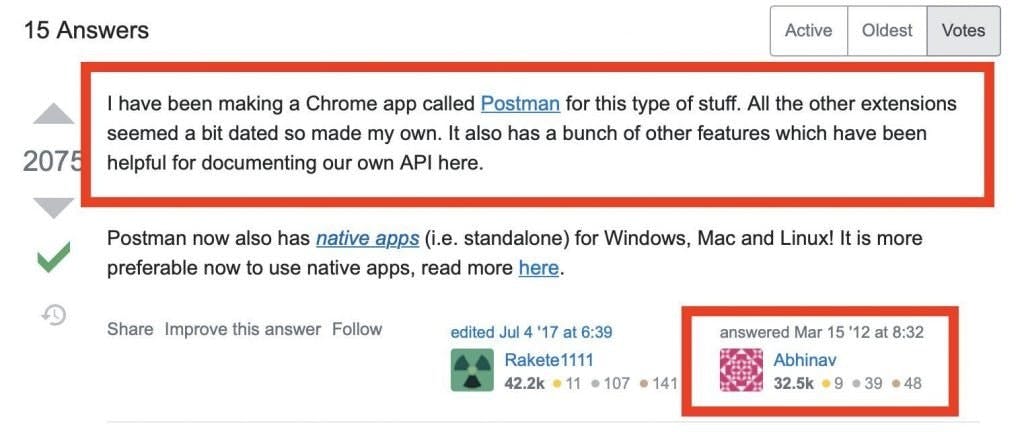
Good things started happening after their launch.
"After some iterating, I put it up on the Chrome Web Store where it really started to take off. Google reached out to tell us how much they liked the Postman tool, and at one point soon thereafter, they even featured us on the home page of the Chrome store, which gave us fantastic visibility."
And then Nexus Ventures came to these 3 guys with a cheque for $7 million and asked them to form a company.
“The folks (at Nexus) reached out saying ‘hey, here’s a cheque and you guys should start formally as a company. So we started."
Dream on.
To keep the startup growing, they expanded into more API protocols: they started with one protocol called REST, but they have now included many other protocols like GraphQL and SOAP.
Their innovation engine went into hyperdrive. They have launched lots of products like API documentation, API automated testing, Mock APIs, API Network, Workspaces, Monitors, etc.
After seeing all these new products, I was confused: Why have they created this random group of products? Why not focus on one product (like testing) and make it the best?
Because they are playing the long game.
Sure, if they focused on only one product, they would make it the best.
But the process of making APIs is long and tiring: you have to write the code for the API, you have to debug and test it, you have to document it, you have to publish the API, and you have to monitor it constantly to check for problems. This is called the API lifecycle.
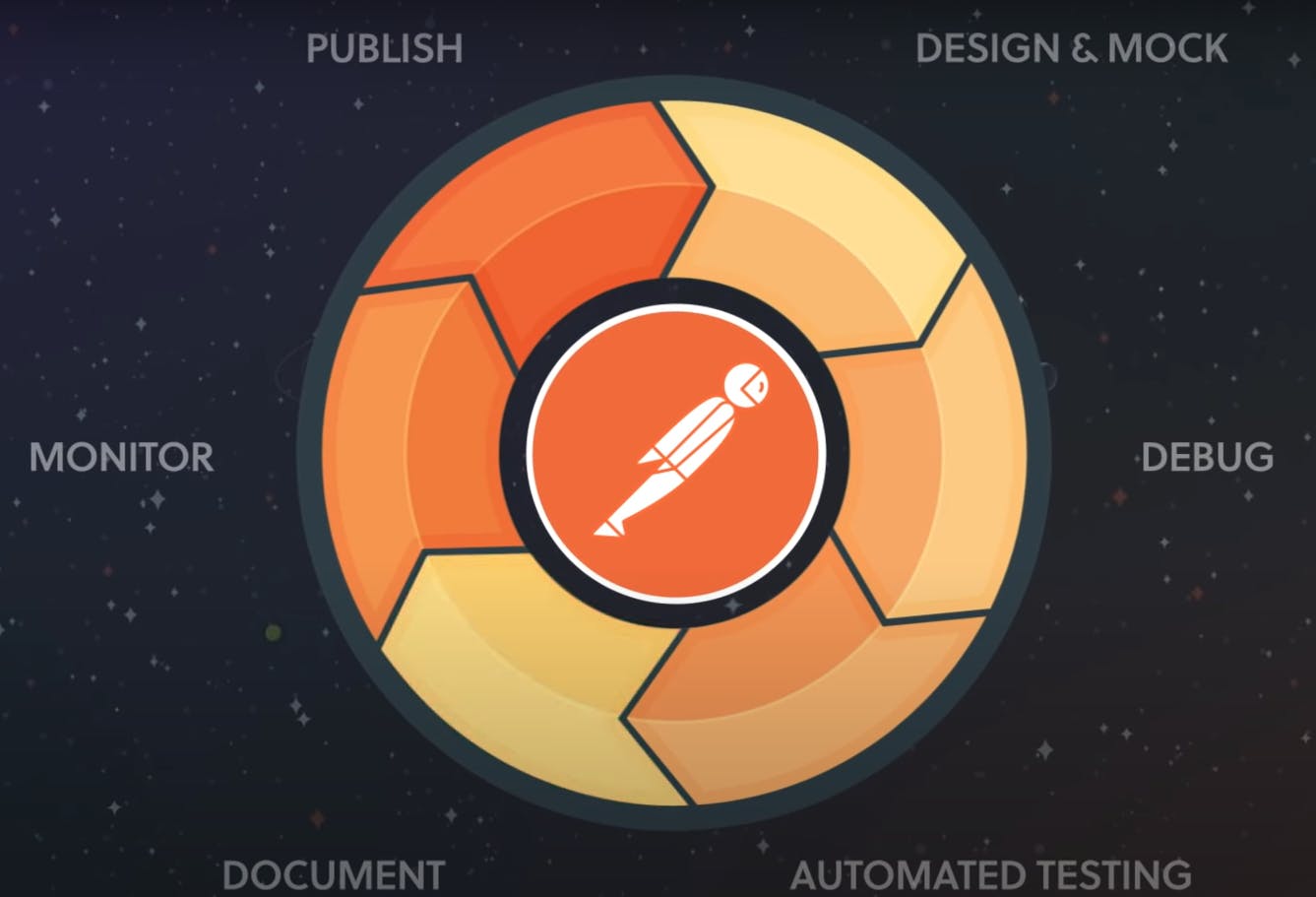
Postman's insight was: if developers can do all the things related to the API lifecycle in one place, life would be much easier for them.
That's why Postman picked each part of the API lifecycle and made a product for it. But making new products alone wasn't sufficient: tomorrow a competitor may come and build a better product.
So Postman tightly integrated all its products so that each Postman product worked better when it was being used along with other Postman products. This insight transformed Postman from a simple API tool to a powerful API platform!
Tightly integrating stuff is not a new thing. Apple is the master of this. They tightly integrate iPhones and Macs and Airpods and Apple Watches so that they work better together.
Tight integration has given a huge competitive advantage to Postman. Even if another company comes up with a better product for one part of the API lifecycle, they will have a tough time convincing developers to leave Postman and switch to their app. Using Postman is convenient for developers and they don't want to hop around different apps for their API work.
A company literally needs to build an entire API platform if it wants to seriously compete against Postman. But this is also a lost cause- Postman is so far ahead and so loved by developers that any other product will be facing an uphill battle.
That's why, even though Postman has many competitors (Swagger, Apiary, Gelato, MuleSoft, Smartbear, Google Apigee API Management Platform, Azure API Management, etc), none of them are serious competitors.
So Postman has done the impossible — it has created a monopoly in this market. We can't see the monopoly because it is such a small market, but as I showed above, the API market is only gonna grow, and so will Postman's monopoly.
They have been strengthening this monopoly by launching new things like the Public API Network and Public Workspaces. Both of these are places for working and collaborating on APIs.
Last year, the Postman Public API Network has become the largest API directory in the world!
I hope you understood my point. The API economy is solving a very important problem for companies. That’s why the API economy will continue its rocketship growth in the future.
Postman realized this fact and bet their entire company on the API economy. They have solved a very important problem for the API economy: building and managing APIs. In the process, they have created an API platform. Postman now has a monopoly in this small but rapidly growing space. This is how Postman became India’s biggest SaaS startup.
Thanks to Nipun Agarwal and Rachitt Shah and Manthan Gupta and Yash Agarwal for helping me out with today’s article.
–
This article originally appeared in Integral, a newsletter to get smarter about Indian startups.
Comments (13)
Prashant Agrawal
Tushar Thakare
Tech Khala
TechKhalaIa ,offering technology tips.
Dave jhon
Hozanas is a luxury online shopping USA
Everett Berry
Cloud Costs | Open Source | Angel
More stories
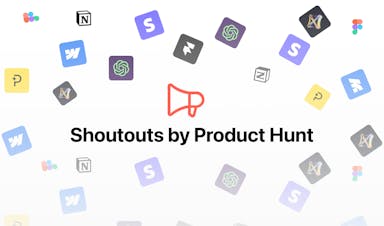
Aaron O'Leary · Announcements · 2 min read
Introducing Shoutouts

Finn Lobsien · Opinions · 5 min read
Can Devin AI Replace Product Managers?

Aaron O'Leary · News · 2 min read
Meet Nvidia's new localized AI chatbot

Sarah Wright · News · 2 min read
The top 15 AI products from 2023


